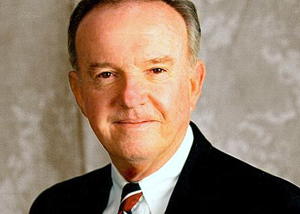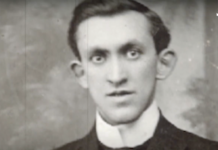By Mark Ellis —

He worked closely with Steve Jobs in the start-up phase at Apple, helping the company grow to $5 billion in revenue. But it was lessons he learned as a Marine Corps infantryman that caused him to find lasting inner peace.
Walt Wilson grew up in New York City during World War II. As a seven-year-old boy, the iconic photo of the Marines raising the flag on Iwo Jima grabbed his attention and he thought, Someday I’d like to be one of those guys.
A few of Walt’s friends found acceptance by joining gangs, and he admits he struggled as an adolescent. “My teen years were about drifting, wasting time, accomplishing nothing,” he recalls. “The life I was living was meaningless, worthless and wrong – a place I didn’t want to be. I felt empty and disconnected.”
One day a recruiting billboard for the Marines caught his eye. He stopped in his tracks to take in the imposing figure dressed in a sharp blue uniform, high collar, gold emblems, white hat, gloves and sword. Beneath the Marine was a simple phrase: “The Marine Corps builds men.”
The poster’s unspoken message about discipline, courage and commitment to a greater cause struck home. He remembered the photo of the Marines raising the flag at Mt.Suribachi. Walt recognized something important: I need to become a man.
Shortly after that, he enlisted and survived recruit training atParris Island,South Carolina. Next came infantry training at Camp Lejeune as a basic rifleman. He was proud to be a “mud-Marine, a grunt.”
Walt’s squad leader, Sergeant Dale Yaw, imparted several truths that left a major impression on him. “Sgt. Yaw told me he would never leave me out there alone,” he notes. Secondly, his sergeant said that if Walt died, he would personally take Walt home.
“A third thing I knew about Sgt. Yaw, though he never said it, was that he would die for his Marines. He demonstrated that this wasn’t just a branch of the military, but a brotherhood.”
Walt’s infantry experience left him with the confidence to face any adversary, but there was one unanswered question that lingered in his mind: If I do die in service to my country, what happens to me then? What comes after death?
When Walt returned home on leave, he spent time with his former high school sweetheart and noticed an unmistakable change in her. She seemed to speak differently, dress differently, and was even more beautiful than he recalled. He was surprised to discover that during his absence, she accepted Jesus Christ as her Lord and Savior.
“My thought was, how weird…I was wearing two dog tags that said I was a Christian, but I was essentially the same as before.” He recognized the Marine Corps discipline had been good for him and changed him in many ways, but spiritually, he was unchanged.
“I had inner confidence but no inner peace, and certainly not the deep peace and assurance of eternal life that I sensed in her.”
Drawn by her inner and outer beauty, the two married and returned to South Carolina for Walt’s last year in the Corps. “We mutually agreed to attending church, which was not initially on my agenda,” he recalls. “I was a Marine and didn’t think about church.”
As he sat in the pew one Sunday morning, a message about Joshua, one of the great military commanders in the Bible, caught his attention. In the Book of Joshua, chapter one, God told Joshua, “I will never leave you nor forsake you.”
Walt instantly recognized a striking similarity from his Marine Corps training. “As Joshua went into battle, God’s promise was to never leave him out there alone. That was Sgt. Yaw’s line!”
Then he listened to the pastor as he quoted Jesus, shortly before the crucifixion: “In my Father’s house are many mansions…And if I go and prepare a place for you, I will come again and receive you to Myself, that where I am, there you may be also.”
Walt’s eyes widened as he considered the obvious parallel. “Sgt. Yaw said he would take me home if I died. Jesus said He is preparing an eternal home for those who believe in Him, and will escort the all the way home, to Heaven.”
The pathway to his heavenly home was only possible because of the cross, the pastor taught. “I was aware of the expression ‘Jesus Christ died for the sins of the world,’ but it meant nothing to me personally.” The idea that Jesus died in Walt’s place was hard to grasp at first.
Walt considered that “the wages of sin is death,” that his sins had caused greater and greater separation from a holy God. However, Jesus took all Walt’s sins upon Himself, and died on the cross in Walt’s place. It seemed incredible that an innocent, sinless man would die to save a sinful man.
He knew that Sgt. Yaw would have laid down his life for his brothers in combat. If his sergeant took the bullet instead of Walt, it might extend Walt’s life for a few years — the remainder of his natural life. But Jesus’ death meant Walt could live forever.
A spark of life-changing faith hit Walt as he considered the eternal implications. “I couldn’t help but invite Jesus Christ into my life,” he says.
The decision to follow the ultimate Commander-in Chief has made all the difference. “I know where I’m going when I die, and I know there’s a purpose for me here and now – that I’m not an accident of nature, but part of His plan. No longer empty and drifting, I have connection, meaning, and a peace that lasts. God has brought me to a place that I couldn’t imagine.”
After three years in the Marine Corps, Walt spent most of his career in high-level management positions in Silicon Valley. He is the founder and chairman of Global Media Outreach, an internet ministry dedicated to giving everyone on earth multiple opportunities to know Jesus.
If you want to know more about a personal relationship with God through His Son Jesus, go here




It was a very encouraging testimony .Thanks.
Comments are closed.